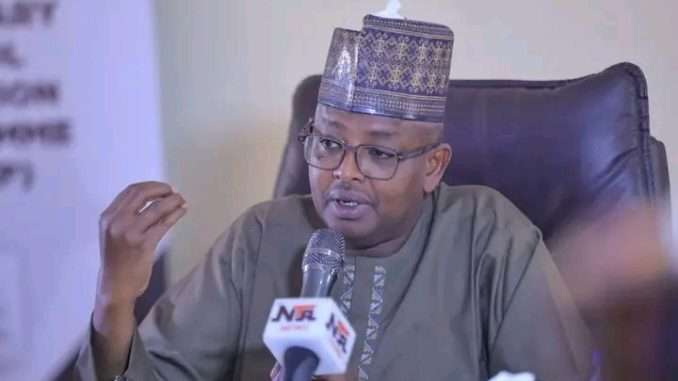
By Ali Mohammed Zanna (9NEWS NIGERIA, BORNO)
Lawan Abba Wakilbe, the Borno Commissioner for Education, Science, Technology, and Innovation, has called for immediate intervention to empower freed Boko Haram captives, emphasizing the need for economic and social support to facilitate their reintegration into society.
He said this during a courtesy visit to his office by Hamsatu Allamin, Chief Executive Officer of the Allamin Foundation for Peace, on Friday.
Mr Wakilbe highlighted the urgency of assisting these victims in helping them resume normal lives.
He mentioned essential needs such as education, health and livelihood support.
Vulnerability and Urgent Needs
Wakilbe expressed concern over the vulnerability of some freed captives, particularly young girls who have faced sexual abuse due to poverty and lack of support. He recounted a distressing encounter with an 11-year-old girl surrounded by three children, noting:
“The Cameroonian authorities repatriated young girls aged 13 to 15 with multiple children. These vulnerable individuals need urgent reintegration and support.”
He attributed the alarming rates of sexual abuse among these individuals to their dire economic circumstances and the absence of viable alternatives for survival.
Call for Vocational Training Centers
The commissioner urged the establishment of Technical, Vocational Education and Training (TVET) centres in border communities such as Bama, Gwoza, and Kamburungara. He stated:
“We need sustainable programs to address their vulnerability and provide alternatives. Poverty drives many of these individuals into vices like prostitution. Once we offer skills and support, they can rebuild their lives.”
Addressing Educational Needs
Wakilbe emphasized the necessity of focusing on children affected by conflict, noting that traditional education systems are ill-equipped to meet their unique needs. He remarked on past failures in integrating these children into regular schools, stating:
“For instance, some of the Chibok girls were enrolled in secondary schools, but the principals reported that they could not handle the unique needs of these children.”
He advocated for specialized educational programs, highlighting the importance of long-term planning to address the educational needs of conflict-affected children.
Critique of Donor Programs
The commissioner criticized some donor-funded initiatives for failing to meet the immediate needs of the region. He stressed the importance of teaching English to help children adapt to modern education rather than focusing on local languages like Hausa in predominantly Kanuri areas.
“There are 67,000 women and children in the camps. We cannot continue turning a blind eye. We must rethink how to educate and reintegrate them,” he said.
Wakilbe noted that the state government has trained over 300 women in vocational skills and provided startup packs to promote self-reliance.
Commitment to Collaboration
Reiterating the government’s commitment, Wakilbe expressed a desire to partner with development organizations and agencies to address the challenges faced by conflict victims.
In response, Allamin called for interventions to tackle critical issues identified during the peace-building program initiated by her organization. She pointed out that immediate, proactive, and sustainable measures are essential to address the dire circumstances of those affected by the insurgency.
Allamin affirmed that the foundation has rehabilitated hundreds of women and girls involved in the conflict, highlighting the need for continued support and intervention.
